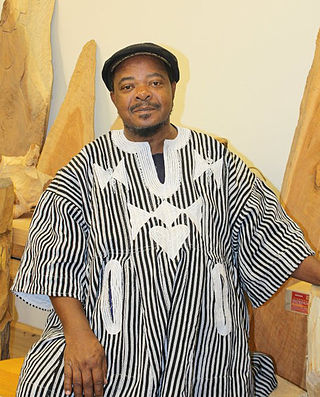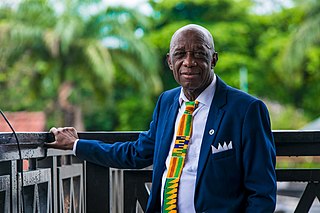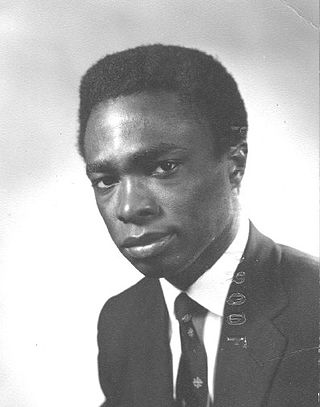Related Research Articles

The University of Dar es Salaam (UDSM) is a public university in Dar es Salaam, Tanzania. It was established in 1961 as an affiliate college of the University of London. The university became an affiliate of the University of East Africa (UEA) in 1963, shortly after Tanzania gained its independence from the United Kingdom. In 1970, UEA split into three independent universities: Makerere University in Uganda, the University of Nairobi in Kenya, and the University of Dar es Salaam.

Cephas Yao Agbemenu is a Ghanaian Art Professor who teaches at the Kenyatta University in Nairobi, Kenya. He is a sculptor and a traditional African wood carver who sees parallels between his carvings and life.
Catherine "Cathy" J. Murphy is an American chemist and materials scientist, and is the Larry Faulkner Professor of Chemistry at the University of Illinois at Urbana-Champaign (UIUC). The first woman to serve as the Head of the Department of Chemistry at UIUC, Murphy is known for her work on nanomaterials, specifically the seed-mediated synthesis of gold nanorods of controlled aspect ratio. She is a member of the American Association for the Advancement of Science, National Academy of Sciences, and the American Academy of Arts and Sciences in 2019.

Thomas O. Mensah is a Ghanaian-American chemical engineer and inventor who contributed to the development of fiber optic manufacturing and nanotechnology. He has 14 patents, and was inducted into the US National Academy of Inventors in 2015. In 2017, Dr. Mensah served as Editor-in-Chief of the textbook Nanotechnology Commercialization, published by John Wiley & Sons.

William Emmanuel Abraham, also known as Willie E. Abraham or, to give his day name, Kojo Abraham, is a retired Ghanaian philosopher.
Tebello Nyokong is a South African chemist and distinguished professor at Rhodes University, and a recipient of South Africa's Order of Mapungubwe. Nyokong's work has been published around 450 times including a patent. She was awarded the South African Chemical Institute Gold Medal in 2012, and named one of the Top 10 Most Influential Women in Science and Technology in Africa by IT News Africa. She is currently researching photo-dynamic therapy, an alternative cancer treatment method to chemotherapy. In 2007, she was one of the top three publishing scientists in South Africa, and in 2013 she was awarded the National Research Foundation's Lifetime Achievement Award.
Maureen Coetzee is a medical entomologist, specialising in African malaria vector mosquitoes for over 40 years. She is currently a Distinguished Professor in the Wits Research Institute for Malaria, School of Pathology at the University of the Witwatersrand. She is a member of the Academy of Science of South Africa. She is a consultant in the World Health Organization 's Global Malaria Programme. She obtained her Doctorate from the University of the Witwatersrand. A subgenus of the Aedes mosquito, Coetzeemyia, was named after her. Also a genus of bacteria strongly associated with malaria mosquitoes, Coetzeea, was named after her. Professor Coetzee has published over 190 peer-reviewed scholarly articles.
Catherine Naliaka Nyongesa Watta, is a Kenyan physician and radiation oncologist, who is the founder, owner and chief executive of Texas Cancer Centre, in Nairobi, the capital and largest city in the country.
Juliet Obanda Makanga is a Kenyan pharmacologist, neuroscientist and medical researcher, who works as a Lecturer in Clinical Pharmacology, at the School of Pharmacy of Kenyatta University, in Kahawa, Nairobi.
Maggie Ireri, is a Kenyan businesswoman and market research professional, who serves as the CEO of TIFA Research Limited, a market research company, headquartered in Nairobi, Kenya's capital city. She is also an award-winning market researcher professional, recognized for her contribution to the development of research methodologies for Africa, by regional research bodies such as Pan Africa Media Research Organisation (PAMRO) and South Africa Market Research Association (SAMRA).
Samuel Nii Odai is a Ghanaian professor of Hydraulics and Water Resources, and a serving Vice Chancellor of Accra Technical University. He is a Commonwealth Academic Fellow, and a recipient of the National Best Research Scientist Gold Award for water, environment and sanitation.

Marian Asantewah Nkansah is a Ghanaian environmental chemist. Her research work focuses on finding solutions to environmental problems associated with levels and fate of toxic substances such as heavy/trace metals, persistent organic pollutants (POPs) and polycyclic aromatic hydrocarbons (PAHs) in food, water, soil, rocks, sediments and other environmental samples. She also researches on the interaction of these pollutants with each other in the environment. In 2016, together with some scientists from the Kwame Nkrumah University of Science and Technology, she led a research which led to the confirmation that edible white clay poses potential cancer risk. In 2016, she became the first scientist to win the Fayzah M. Al-Kharafi Prize, an annual award that recognises exceptional women scientists from scientifically and technologically lagging countries. She and Collins Obuah, another scientist from the University of Ghana, were the two scientist selected to attend the Lindau Nobel Laureate meeting in 2017.In 2021, she was among five women recipients in developing countries of the OWSD-Elsevier Foundation Awards. She received the 2022 Africa Role Model Overall Female Personality Award, and was inducted as a Fellow of the Ghana Academy of Arts and Sciences the same year.
Rita Akosua Dickson is a Ghanaian phytochemist and the first female Vice-Chancellor of the Kwame Nkrumah University of Science and Technology.
Janice Leigh Limson is a South African Professor of Biotechnology, former Chairperson the School of Biotechnology at Rhodes University and the SARChI Chair in Biotechnology Innovation & Engagement at Rhodes University. She is founder and editor-in-chief of the magazine Science in Africa, the first popular online science magazine for Africa. Her research focuses on topics ranging from the development of nanotechnology biosensors for cancer diagnostics, drug delivery, detection of pathogens in food to the design of fuel cell technology.
Adolé Isabelle Glitho-Akueson is a Togolese entomologist who is Professor of Animal Biology at the University of Lomé. She is the chair of UNESCO's "Women, Science and Sustainable Water Management in West Africa and Central Africa" committee and a Fellow of the African Academy of Sciences.
Richard Tuyee Awuah is a Ghanaian academic, and Plant Pathologist. He was the dean of the faculty of Agriculture of the Kwame Nkrumah University of Science and Technology, and the principal of the University of Education's College of Agriculture.
Eno Ebenso is a Nigerian Professor of Physical Chemistry in the Okobo local government area of Akwa Ibom State, Nigeria who rose from the rank of Assistant lecturer to a Professor in the Department of Physical Chemistry, University of Calabar in 2009. Eno Ebenso eventually got appointment with the Department of Chemistry, North West University, South Africa and currently with the Institute of Nanotechnology and Water Sustainability, CSET, University of South Africa. He is a known authority on chemistry of corrosion and has published extensively in the area of corrosion inhibition chemistry with an n H-Index of 40 and over 5406 total citations from the Scopus Search Engine of Elsevier Science since 1996 according to the Elsevier SciVal Insights Report (2010-2015). He has a citation impact of 10% above the world average; he is the second most prolific author in the field of corrosion inhibition world wide and has the fifth most downloads of his publications globally in the field of corrosion inhibition with Google Scholar Citations of over 6000 since 2011 with an H index of 51 and i10-index of 139.
Peggy Oti-Boateng is a Ghanaian bio-chemist. She is the current executive director of African Academy of Sciences. She is the immediate former head of UNESCO Science Policy and Capacity Building Department. She was also a former head of the Sciences Sector for the Southern African Development Community, director of the Research Centre at the Kwame Nkrumah University of Science and Technology and former chair of the BioInnovate Africa Programme Advisory Committee (PAC).
Philiswa Nomngongo is a South African professor of Analytical Chemistry and the South African Research Chair (SARChI) in nanotechnology for water. Her research focuses on environmental analytical chemistry and the use of nanomaterials for water treatment, water remediation, and water quality analysis and monitoring.
Etheresia Pretorius is a South African scientist. She is Distinguished Professor and head of the Department of Physiological Sciences at Stellenbosch University. Her research deals with coagulation in a variety of medical conditions including type 2 diabetes, chronic fatigue syndrome, Alzheimer’s, Parkinson’s, COVID-19 and Long COVID.
References
- ↑ "Members". Academy of Science of South Africa . Retrieved 17 October 2017.
- 1 2 "Professor Jane Catherine Ngila: Specialist in nanotechnology for water treatment". Mail Guardian. 15 August 2016. Retrieved 17 October 2017.
- 1 2 "Prof Catherine Ngila". School of Chemistry University of New South Wales . Retrieved 17 October 2017.
- ↑ "Ngila Jane Catherine | The AAS". aasciences.ac.ke. Retrieved 26 June 2019.
- ↑ "Prof. Jane Catherine Ngila, Riara University (Nurturing Innovators)". Archived from the original on 26 June 2019. Retrieved 26 June 2019.
- ↑ "Scopus preview – Scopus – Author details (Ngila, Jane Catherine)". www.scopus.com. Retrieved 26 June 2019.
- ↑ "AU announces Kwame Nkrumah awards for African women in science | Africa Times". africatimes.com. Retrieved 17 October 2017.